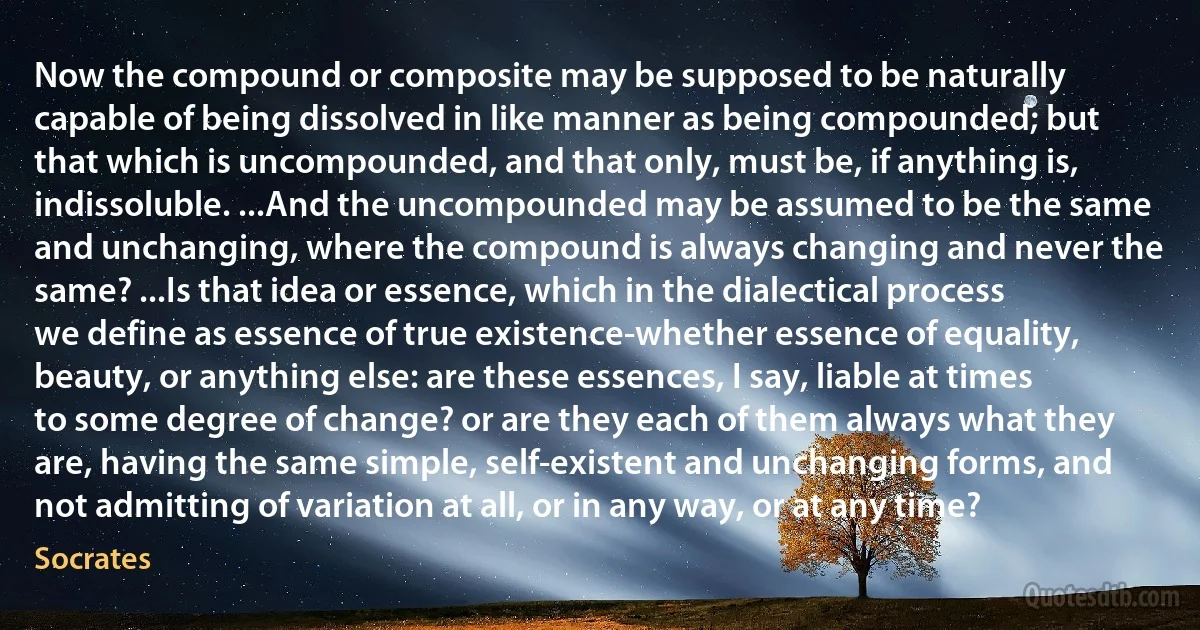
Now the compound or composite may be supposed to be naturally capable of being dissolved in like manner as being compounded; but that which is uncompounded, and that only, must be, if anything is, indissoluble. ...And the uncompounded may be assumed to be the same and unchanging, where the compound is always changing and never the same? ...Is that idea or essence, which in the dialectical process we define as essence of true existence-whether essence of equality, beauty, or anything else: are these essences, I say, liable at times to some degree of change? or are they each of them always what they are, having the same simple, self-existent and unchanging forms, and not admitting of variation at all, or in any way, or at any time?
SocratesRelated topics
anything beauty changing change composite compound define degree having idea now say simple times time variation wayRelated quotes
I am not insensible to natural beauty, but my emotional joys center on the improbable yet sometimes wondrous works of that tiny and accidental evolutionary twig called Homo sapiens. And I find, among these works, nothing more noble than the history of our struggle to understand nature-a majestic entity of such vast spatial and temporal scope that she cannot care much for a little mammalian afterthought with a curious evolutionary invention, even if that invention has, for the first time in some four billion years of life on earth, produced recursion as a creature reflects back upon its own production and evolution. Thus, I love nature primarily for the puzzles and intellectual delights that she offers to the first organ capable of such curious contemplation.

Stephen Jay Gould
He went on to speak of the manner in which slavery was treated by the Constitution. The word 'slave' is no where used; the supply of slaves was to be prohibited after 1808; they stopped the spread of it in the territories; seven of the states abolished it. He argued very conclusively that it was then regarded as an evil which would eventually be got rid of, and that they desired, once rid of it, to have nothing in the constitution to remind them of it. The Republicans go back to first principles and deal with it as a wrong. Mason, of Va., said openly that the framers of our government were anti-slavery. Hammond of S.C., said 'Washington set this evil example'. Bully Brooks said: 'At the time the Constitution was formed, no one supposed slavery would last till now.'

Abraham Lincoln
Prospero wears a large, heavy, dark-blue cloak or gown that enfolds him like a quilted blanket... it is darkly embroidered with small wine-coloured beads and swirls of black vegetation... it has long strings and ornate tassels that trail to the ground... it is a garment that has often been worn... a little frayed and scuffed. Later it will be seen to be capable of changing colour... in seven stages comparable to the power of Prospero's magic... black, brown, dark blue, light blue, purple, dark red and fiery red... and to have a vivid lining embroidered with dazzling stars -- a lining that is only revealed in flashes as when a dark butterfly momentarily uncovers coloured underwings.

Peter Greenaway
Even the widespread resort to shifting cultivation with burning and light hoeing was not as childish as the first European colonialists supposed. That simple form of agriculture was based on a correct evaluation of the soil potential, which was not as great as initially appears from the heavy vegetation; and when the colonialists started upsetting the thin topsoil the result was disastrous. The above remarks show that when an outsider comes into a new ecological system, even if he is more skilled he does not necessarily function as effectively as those who have familiarized themselves with the environment over centuries; and the newcomer is likely to look more ridiculous if he is too arrogant to realize that he has something to learn from the "natives.”.

Walter Rodney
As Locke sees, equality in authority entails denying to the legal system's administrators-and thus to the legal system itself-any powers beyond those possessed by private citizens:The law of nature is in that state put into every man's hands, whereby every one has a right to punish the transgressors of that law to such a degree as may hinder its violation.... For in that state of perfect equality, where naturally there is no superiority or jurisdiction of one over another, what any may do in prosecution of that law, every one must needs have a right to do.Lockean equality involves not merely equality before legislators, judges, and police, but, far more crucially, equality with legislators, judges, and police.

Roderick Long
